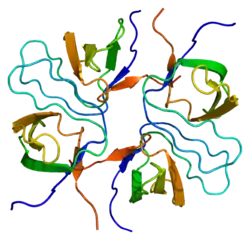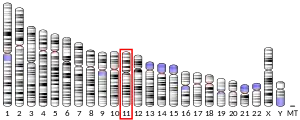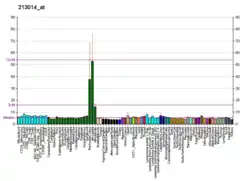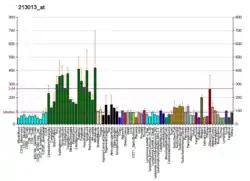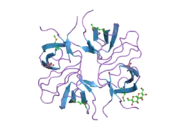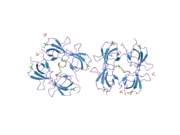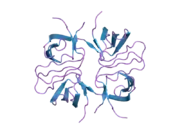MAPK8IP1
C-jun-amino-terminal kinase-interacting protein 1 is an enzyme that in humans is encoded by the MAPK8IP1 gene.[5][6]
The protein encoded by this gene is a regulator of the pancreatic beta-cell function. It is highly similar to JIP-1, a mouse protein known to be a regulator of c-Jun amino-terminal kinase (Mapk8). This protein has been shown to prevent MAPK8 mediated activation of transcription factors, and decrease IL-1 beta and MAP kinase kinase 1 (MEKK1) induced apoptosis in pancreatic beta cells. This protein also functions as a DNA-binding transactivator of the glucose transporter GLUT2. RE1-silencing transcription factor (REST) is reported to repress the expression of this gene in insulin-secreting beta cells. This gene is found to be mutated in a type 2 diabetes family, and thus is thought to be a susceptibility gene for type 2 diabetes.[7]
Interactions
MAPK8IP1 has been shown to interact with MAP3K10,[8] DUSP16,[9] Mitogen-activated protein kinase 9,[8][10] MAPK8,[10][11] LRP2,[12][13] LRP1,[12] MAP3K12,[8] MAP2K7,[8] MAPK8IP2[8] and MAP3K11.[8]
References
- GRCh38: Ensembl release 89: ENSG00000121653 - Ensembl, May 2017
- GRCm38: Ensembl release 89: ENSMUSG00000027223 - Ensembl, May 2017
- "Human PubMed Reference:". National Center for Biotechnology Information, U.S. National Library of Medicine.
- "Mouse PubMed Reference:". National Center for Biotechnology Information, U.S. National Library of Medicine.
- Dickens M, Rogers JS, Cavanagh J, Raitano A, Xia Z, Halpern JR, Greenberg ME, Sawyers CL, Davis RJ (August 1997). "A cytoplasmic inhibitor of the JNK signal transduction pathway". Science. 277 (5326): 693–6. doi:10.1126/science.277.5326.693. PMID 9235893.
- Bonny C, Nicod P, Waeber G (March 1998). "IB1, a JIP-1-related nuclear protein present in insulin-secreting cells". J Biol Chem. 273 (4): 1843–6. doi:10.1074/jbc.273.4.1843. PMID 9442013.
- "Entrez Gene: MAPK8IP1 mitogen-activated protein kinase 8 interacting protein 1".
- Yasuda, J; Whitmarsh A J; Cavanagh J; Sharma M; Davis R J (October 1999). "The JIP Group of Mitogen-Activated Protein Kinase Scaffold Proteins". Mol. Cell. Biol. 19 (10): 7245–54. doi:10.1128/mcb.19.10.7245. ISSN 0270-7306. PMC 84717. PMID 10490659.
- Willoughby, Emma A; Perkins Gordon R; Collins Mary K; Whitmarsh Alan J (March 2003). "The JNK-interacting protein-1 scaffold protein targets MAPK phosphatase-7 to dephosphorylate JNK". J. Biol. Chem. 278 (12): 10731–6. doi:10.1074/jbc.M207324200. ISSN 0021-9258. PMID 12524447.
- Whitmarsh, A J; Cavanagh J; Tournier C; Yasuda J; Davis R J (September 1998). "A mammalian scaffold complex that selectively mediates MAP kinase activation". Science. 281 (5383): 1671–4. doi:10.1126/science.281.5383.1671. ISSN 0036-8075. PMID 9733513.
- Cai, Yi; Lechner Mark S; Nihalani Deepak; Prindle Marc J; Holzman Lawrence B; Dressler Gregory R (January 2002). "Phosphorylation of Pax2 by the c-Jun N-terminal kinase and enhanced Pax2-dependent transcription activation". J. Biol. Chem. 277 (2): 1217–22. doi:10.1074/jbc.M109663200. ISSN 0021-9258. PMID 11700324.
- Gotthardt, M; Trommsdorff M; Nevitt M F; Shelton J; Richardson J A; Stockinger W; Nimpf J; Herz J (August 2000). "Interactions of the low density lipoprotein receptor gene family with cytosolic adaptor and scaffold proteins suggest diverse biological functions in cellular communication and signal transduction". J. Biol. Chem. 275 (33): 25616–24. doi:10.1074/jbc.M000955200. ISSN 0021-9258. PMID 10827173.
- Petersen, Helle Heibroch; Hilpert Jan; Militz Daniel; Zandler Valerie; Jacobsen Christian; Roebroek Anton J M; Willnow Thomas E (February 2003). "Functional interaction of megalin with the megalinbinding protein (MegBP), a novel tetratrico peptide repeat-containing adaptor molecule". J. Cell Sci. 116 (Pt 3): 453–61. doi:10.1242/jcs.00243. ISSN 0021-9533. PMID 12508107.
Further reading
- Andersson B, Wentland MA, Ricafrente JY, et al. (1996). "A "double adaptor" method for improved shotgun library construction". Anal. Biochem. 236 (1): 107–13. doi:10.1006/abio.1996.0138. PMID 8619474.
- Yu W, Andersson B, Worley KC, et al. (1997). "Large-Scale Concatenation cDNA Sequencing". Genome Res. 7 (4): 353–8. doi:10.1101/gr.7.4.353. PMC 139146. PMID 9110174.
- Whitmarsh AJ, Cavanagh J, Tournier C, et al. (1998). "A mammalian scaffold complex that selectively mediates MAP kinase activation". Science. 281 (5383): 1671–4. doi:10.1126/science.281.5383.1671. PMID 9733513.
- Mooser V, Maillard A, Bonny C, et al. (1999). "Genomic organization, fine-mapping, and expression of the human islet-brain 1 (IB1)/c-Jun –amino-terminal kinase interacting protein-1 (JIP-1) gene". Genomics. 55 (2): 202–8. doi:10.1006/geno.1998.5641. PMID 9933567.
- Yasuda J, Whitmarsh AJ, Cavanagh J, et al. (2000). "The JIP Group of Mitogen-Activated Protein Kinase Scaffold Proteins". Mol. Cell. Biol. 19 (10): 7245–54. doi:10.1128/mcb.19.10.7245. PMC 84717. PMID 10490659.
- Meyer D, Liu A, Margolis B (2000). "Interaction of c-Jun amino-terminal kinase interacting protein-1 with p190 rhoGEF and its localization in differentiated neurons". J. Biol. Chem. 274 (49): 35113–8. doi:10.1074/jbc.274.49.35113. PMID 10574993.
- Kelkar N, Gupta S, Dickens M, Davis RJ (2000). "Interaction of a Mitogen-Activated Protein Kinase Signaling Module with the Neuronal Protein JIP3". Mol. Cell. Biol. 20 (3): 1030–43. doi:10.1128/MCB.20.3.1030-1043.2000. PMC 85220. PMID 10629060.
- Waeber G, Delplanque J, Bonny C, et al. (2000). "The gene MAPK8IP1, encoding islet-brain-1, is a candidate for type 2 diabetes". Nat. Genet. 24 (3): 291–5. doi:10.1038/73523. PMID 10700186. S2CID 5964917.
- Bonny C, Oberson A, Steinmann M, et al. (2000). "IB1 reduces cytokine-induced apoptosis of insulin-secreting cells". J. Biol. Chem. 275 (22): 16466–72. doi:10.1074/jbc.M908297199. PMID 10748095.
- Gotthardt M, Trommsdorff M, Nevitt MF, et al. (2000). "Interactions of the low density lipoprotein receptor gene family with cytosolic adaptor and scaffold proteins suggest diverse biological functions in cellular communication and signal transduction". J. Biol. Chem. 275 (33): 25616–24. doi:10.1074/jbc.M000955200. PMID 10827173.
- Bonny C, Oberson A, Negri S, et al. (2001). "Cell-permeable peptide inhibitors of JNK: novel blockers of beta-cell death". Diabetes. 50 (1): 77–82. doi:10.2337/diabetes.50.1.77. PMID 11147798.
- Verhey KJ, Meyer D, Deehan R, et al. (2001). "Cargo of Kinesin Identified as Jip Scaffolding Proteins and Associated Signaling Molecules". J. Cell Biol. 152 (5): 959–70. doi:10.1083/jcb.152.5.959. PMC 2198804. PMID 11238452.
- Matsuda S, Yasukawa T, Homma Y, et al. (2001). "c-Jun N-terminal kinase (JNK)-interacting protein-1b/islet-brain-1 scaffolds Alzheimer's amyloid precursor protein with JNK". J. Neurosci. 21 (17): 6597–607. doi:10.1523/JNEUROSCI.21-17-06597.2001. PMC 6763068. PMID 11517249.
- Abderrahmani A, Steinmann M, Plaisance V, et al. (2001). "The Transcriptional Repressor REST Determines the Cell-Specific Expression of the Human MAPK8IP1 Gene Encoding IB1 (JIP-1)". Mol. Cell. Biol. 21 (21): 7256–67. doi:10.1128/MCB.21.21.7256-7267.2001. PMC 99900. PMID 11585908.
- Cai Y, Lechner MS, Nihalani D, et al. (2002). "Phosphorylation of Pax2 by the c-Jun N-terminal kinase and enhanced Pax2-dependent transcription activation". J. Biol. Chem. 277 (2): 1217–22. doi:10.1074/jbc.M109663200. PMID 11700324.
- Scheinfeld MH, Roncarati R, Vito P, et al. (2002). "Jun NH2-terminal kinase (JNK) interacting protein 1 (JIP1) binds the cytoplasmic domain of the Alzheimer's beta-amyloid precursor protein (APP)". J. Biol. Chem. 277 (5): 3767–75. doi:10.1074/jbc.M108357200. PMID 11724784.
- Ikeda A, Hasegawa K, Masaki M, et al. (2002). "Mixed lineage kinase LZK forms a functional signaling complex with JIP-1, a scaffold protein of the c-Jun NH(2)-terminal kinase pathway". J. Biochem. 130 (6): 773–81. doi:10.1093/oxfordjournals.jbchem.a003048. PMID 11726277.
- Hashimoto M, Hsu LJ, Rockenstein E, et al. (2002). "alpha-Synuclein protects against oxidative stress via inactivation of the c-Jun N-terminal kinase stress-signaling pathway in neuronal cells". J. Biol. Chem. 277 (13): 11465–72. doi:10.1074/jbc.M111428200. PMID 11790792.
